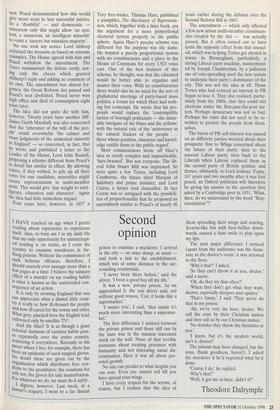Second opinion
I HAVE reached an age when I prefer reading about experience to experience itself. Alas, so busy am I in my daily life that my only opportunity for uninterrupt- ed reading is on trains, as I cross the country to examine murderers in far- flung prisons. Without the commission of such heinous offences, therefore, I should scarcely ever manage more than a few pages at a time. I believe the salutary effect of a murder on my reading habits is what is known as the unintended con- sequence of an action.
It is only by crossing England that one can appreciate what a dismal little coun- try it really is: how ill-dressed the people and how ill-cared for the towns and cities. What grey, pinched lives the English lead, enlivened only by satellite TV! And the litter! It is as though a giant celestial dustman of careless habits pass- es repeatedly over the entire country, scattering it everywhere. Recently in the street where I live, for example, there has been an epidemic of used surgical gloves. No doubt these are given out by the organisation which distributes free con- doms to the prostitutes: the condoms for safe sex, the gloves for safe masturbation. For whatever we do, we must do it safely.
, digress, however. Last week, at a lawyer's request, I went to a far distant prison to examine a murderer. I arrived in the city — an utter dump, as usual and took a taxi to the establishment, which was at some distance in the sur- rounding countryside.
`I never been there before,' said the driver. 'I been a good boy all my life.'
It was a new, private prison. As we approached it, the taxi driver said, not without good reason, 'Cor, it looks like a supermarket.'
`I assure you', I said, 'that inside it's much more interesting than a supermar- ket.'
The first difference I noticed between the private prison and those still run by the state was in the mission statement stuck on the wall. None of that terrible nonsense about treating prisoners with humanity and not tolerating racial dis- crimination. Here it was all about per- sonal growth: No one can predict to what heights you can soar. Even you cannot tell till you have spread your wings. I have every respect for the screws, of course, but I confess that the idea of them spreading their wings and soaring, Icearus-like but with beer-bellies down- wards, caused a faint smile to play upon my lips.
The next major difference I noticed (apart from the uniforms) was the furni- ture in the doctor's room: it was screwed to the floor.
`Why's that?' I asked.
`So they can't throw it at you, doctor,' said a nurse.
`Oh, do they try that often?'
`When they don't get what they want, doctor, especially sleepers and opiates.'
`That's funny,' I said 'They never do that in my prison.'
`Ah, we're very lax here, doctor. We call the cons by their Christian names and they call us by our Christian names.'
`No wonder they throw the furniture at you.'
`I know, but it's the modern world, isn't it, doctor?
The prisons may have changed, but the cons, thank goodness, haven't. I asked the murderer if he'd regretted what he'd done.
`Course I do,' he replied.
`Why's that?'
`Well, it got me in here, didn't it?'
Theodore Dalrymple


















































































 Previous page
Previous page